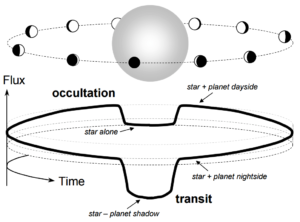It was close to the end of 2019 Summer term when I got an e-mail reply from one of my professors offering me a 6 weeks project at the Exoplanets Research group within the School of Physics and Astronomy.
My name is Mukul and I’m a final year MSci Physics and Astrophysics student. I spent most of my summer this year working on a little research project with Dr. Amaury Triaud. The project dealt with simulating exoplanet transits and analysing various observing strategies in order to find the one with a better transit detection probability. I know, it sounds confusing. But bear with me on this. Exoplanets, planets orbiting starts other than the Sun, are very difficult to discover. So, for ground-based surveys with limited observation time, we can increase our detection probability by simulating the observation for different observing plans and investigate the most effective method to employ. During those 6 weeks I gained a great deal of independent research experience and got some useful advice from the PhD students and Post Docs at the research group on future careers in Astrophysics.
I began my internship familiarising myself with the concept of exoplanet detection, which wasn’t too difficult since I had taken Dr. Triaud’s Exoplanet module in my 3rd year and brushed up my coding skills by reproducing results from a research paper. Even though I’m a Physics student, computing is a significant part of my academia, especially in Astronomy. My first role was to simulate a simple observation followed by injecting exoplanet transits into it and checking if these transits can be detected in this observation or not. I created a function that does exactly that for each of these three cases and once this foundation was laid, I gradually made them more and more sophisticated as we went along. The project was almost entirely based on programming in the Python language which immensely improved my coding expertise and helped me prepare for my 4th year Masters project.
Every week, I would have a meeting my Dr. Triaud discussing my weekly progress and coming up with different angles of approaching this project. I worked solely on my laptop at my desk in the Research group office along with other PhD students which gave me a very good feel of what a day-to-day life would be like as a PhD student. The office environment was very casual and friendly. Every day, we would all have lunch together in the kitchen lounge and have a little break from our research. Once on a nice sunny day, we even had a little picnic lunch on the grass right beside the Old Joe which was very refreshing. I also had the opportunity of joining a few Post Docs and PhD students in an Archive meeting where every Tuesday we discussed interesting and latest astrophysics research papers.
By the end, I had successfully written a complete script which can be used by anyone to test various observing strategies and find out the detection probability of exoplanets with different orbital periods. If you’d like to give it a go, you can find the code on my GitHub page https://github.com/MXK606/exoplanets-research. I am very thankful of Dr. Triaud for giving me such a wonderful opportunity. I enjoyed every single day of my 6 weeks research and now I will be extending this research even further as my 4th year Masters project with him.


Mukul – final year MSci Physics and Astrophysics student
